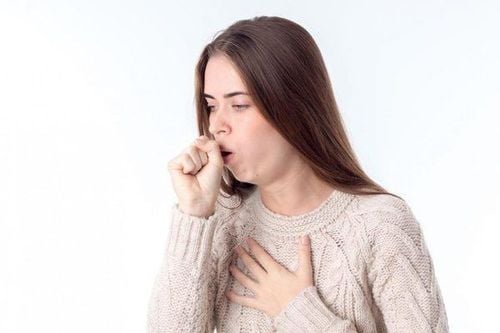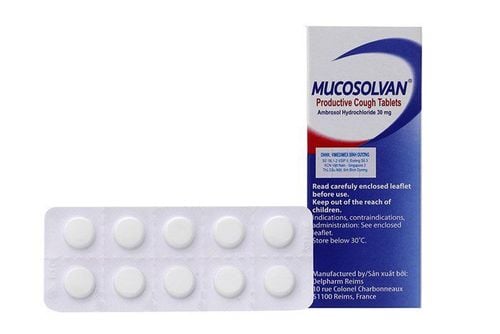Written by Master, Doctor Mai Vien Phuong - Department of Examination & Internal Medicine - Vinmec Central Park International General Hospital.
Coughing is the body's way of trying to remove mucus, foreign substances and bacteria that can cause infection and disease in the lungs. However, when coughing is prolonged, coughing a lot will make the patient uncomfortable, tired, even to the point of vomiting and need timely treatment.
1. Why do we cough?
Coughing is the body's way of trying to clear mucus, foreign substances, and bacteria that can cause infection and disease in the lungs. You may cough due to environmental irritants that you are sensitive to. It can also be due to an allergic reaction, a viral infection, or a bacterial infection.
A number of diseases and conditions can cause both adults and children to cough so hard that they vomit.
1.1. Causes in adults
A number of conditions can cause intermittent coughing in adults. This can be the result of an acute, short-term illness or an allergy. They can also be chronic and last for weeks, months, or even years.
Causes of severe coughing that causes vomiting include:
- Smoking: A smoker's cough can be wet or dry and can cause vomiting and other serious health problems such as emphysema.
- Postnasal drip: Mucus is produced that runs down the throat, causing coughing spells that can cause vomiting.
- Asthma: Coughing, wheezing, shortness of breath, and excess mucus production are all symptoms of asthma. These symptoms can also cause vomiting.
- Asthma-like cough: Coughing is the only symptom of this type of asthma. It produces a dry, persistent cough that can be severe enough to cause vomiting.
- Acid reflux and gastroesophageal reflux disease (GERD): Acid reflux and GERD can both irritate the lower esophagus. This can cause coughing and sore throat, among other symptoms.
- Acute bronchitis: This type of infection causes a cough that can produce large amounts of mucus, which can cause gagging and vomiting. A dry, wheezing cough that is severe enough to cause vomiting can continue for weeks after the infection has cleared.
- Pneumonia: This infection can cause severe coughing and vomiting as mucus is expelled from the lungs or severe post nasal drip.
- Blood pressure medications: Angiotensin-converting enzyme (ACE) inhibitors sometimes cause chronic, severe coughs. ACE inhibitors are used to treat high blood pressure and heart failure.

1.2. Causes in children
Some of the conditions that cause vomiting associated with coughing in adults can also have similar effects in children. These include pneumonia, bronchitis, asthma, cough-variant asthma, postnasal drip, and acid reflux.
Other conditions include:
- Whooping cough: This is a respiratory infection. It causes rapid, violent coughing spells. They often suck all the air out of the lungs, leaving the person gasping for oxygen. This causes a whooping sound. Vomiting is a common response to these symptoms.
- Respiratory syncytial virus (RSV): RSV causes inflammation of the lungs and respiratory tract. It is the leading cause of bronchitis and pneumonia in infants.
2. When is coughing and vomiting an emergency?
Vomiting from coughing is not a medical emergency. If it is accompanied by other symptoms, seek immediate medical attention:
- Coughing up blood
- Difficulty breathing or rapid breathing
- Lips, face, or tongue turning blue or dark
- Symptoms of dehydration
3. Diagnose the underlying condition causing the severe cough
Your doctor will want to rule out seasonal allergies and other potential allergens as the cause. They will ask about other symptoms you may be experiencing, such as heartburn, fever, and muscle aches, to determine whether you may have acid reflux, GERD, the common cold, or the flu.
Some tests that may be used to diagnose this condition in adults and children include:
- Chest X-ray: To look for signs of pneumonia
- Sinus X-ray: To look for sinus infections
- CT scan: To look for areas of infection in the lungs or sinus cavities
- Pulmonary function test: To give your doctor information about your ability to breathe in to diagnose asthma
- Spirometry test: To give information about your ability to breathe in and asthma
- Bronchoscopy test: Requires a bronchoscope, which has a small camera and light to look at your lungs and airways, or a similar tube, called a rhinoscope, which can be used to look at your nasal passages

4. How is a severe cough treated?
The underlying condition of your symptoms needs to be treated for your cough and vomiting to go away. Some medications used to treat coughs include:
- Decongestants: For allergies and postnasal drip
- Glucocorticoids: For asthma, allergies, or postnasal drip
- Bronchodilators or inhalers: For asthma
- Antihistamines: For allergies and postnasal drip
- Cough suppressants: For coughs with no known cause
- Antibiotics: For bacterial infections, including whooping cough
- Acid blockers: For acid reflux and GERD
Most conditions benefit from bed rest and plenty of fluids. If symptoms get worse or don’t improve within a few days, ask your doctor about next steps.
Most conditions that cause this symptom are acute and short-lived. Once the underlying cause has been addressed, your cough and vomiting should go away.
Some conditions that cause these symptoms are long-term and require ongoing medical care and medication. In many cases, your symptoms will improve if you follow the treatment plan your doctor has created for you.
Vinmec International General Hospital is one of the hospitals that not only ensures professional quality with a team of leading doctors and medical staff, a system of modern technological equipment, but also stands out with comprehensive and professional examination, consultation and treatment services; a civilized, polite, safe and maximally sterile examination and treatment space.
5. Can a bad cough be prevented?
Not smoking is one of the best ways to protect your health. If you smoke, talk to your doctor about a smoking cessation regimen to prevent a chronic cough.
Other ways you can prevent this symptom are to keep your environment free of allergens, dust, and chemical irritants. An air purifier can help you do this.
Washing your hands often and avoiding people who are sick will help you avoid many of the germs that cause colds, flus, and other illnesses that have symptoms of coughing and vomiting.
To arrange an appointment, please call HOTLINE or make your reservation directly HERE. You may also download the MyVinmec app to schedule appointments faster and manage your reservations more conveniently.














